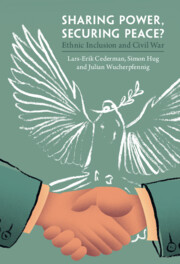Book contents
- Frontmatter
- Contents
- Figures
- Tables
- Preface
- 1 Introduction
- Part I Theories and Concepts
- Part II Analyzing the Effect of Power Sharing on CivilWar
- Part III Power Sharing and Civil War in Time and Space
- 10 The Diffusion of Power Sharing
- 11 Trends in Power Sharing and Conflict
- 12 Conclusions for Theory and Policy
- Bibliography
- Index
11 - Trends in Power Sharing and Conflict
from Part III - Power Sharing and Civil War in Time and Space
Published online by Cambridge University Press: 23 June 2022
- Frontmatter
- Contents
- Figures
- Tables
- Preface
- 1 Introduction
- Part I Theories and Concepts
- Part II Analyzing the Effect of Power Sharing on CivilWar
- Part III Power Sharing and Civil War in Time and Space
- 10 The Diffusion of Power Sharing
- 11 Trends in Power Sharing and Conflict
- 12 Conclusions for Theory and Policy
- Bibliography
- Index
Summary
Many scholars have detected a decrease in political violence in recent decades, but the causes of this decline remain unclear. As a contribution to this debate, this chapter revisits the controversy over trends in conflict after the end of the Cold War. While several scholars made ominous predictions of surging ethnic warfare, Ted Robert Gurr presented evidence of a pacifying trend since the mid?1990s and predicted a further decline in ethnic conflict in an article on"ethnic warfare on the wane." Leveraging more recent data on ethnic groups and their participation in ethnic civil wars, this chapter evaluates if Gurr was right about the decline of ethnic conflict, and if he was right for the right reasons. We assess whether an increase in governments' accommodative policies toward ethnic groups can plausibly account for a decline in ethnic civil war. Our findings are largely compatible with Gurr's observations and stand in stark contrast to various pessimistic projections that were made in the early post-Cold War period. Among a number of empirical dimensions, we have found that this relatively optimistic perspective holds up well despite a surge in civil conflict in recent years. Ethnic, as opposed to non-ethnic, civil wars appear to have subsided after the mid-1990s, and this decline is at least partially attributable to an increase in governments' accommodative policies toward ethnic groups, such as the granting of group rights, regional autonomy, and inclusion through governmental power sharing, as well as democratization and peacekeeping.
Keywords
- Type
- Chapter
- Information
- Sharing Power, Securing Peace?Ethnic Inclusion and Civil War, pp. 238 - 270Publisher: Cambridge University PressPrint publication year: 2022

